Opinion | European energy crisis fails citizens
Photo courtesy of John MacDougall/AFP via Getty Images/TNS
View of the Pipeline Inspection Gauge receiving station, the Nord Stream 2 part of the landfall area in Lubmin on Germany’s Baltic Sea coast, on Sept. 21, 2021.
September 22, 2022
Decades of political tension reached new heights on February 24th of this year, when a long-lasting encroachment on Ukrainian territory by Russian forces finally escalated into a full-scale invasion. The EU, seeking to show solidarity with Ukraine and NATO against Russia, imposed strict sanctions against Russia for this unprovoked invasion.
However, in doing this, they played a dangerous game, as they are quite reliant on Russia, which holds a grip on European natural resource needs.
Europe receives about 40% of its natural gas supply by pipeline from Russia, and roughly half of all Russian crude oil produced went to Europe prior to the invasion of Ukraine.
As expected, as of August of this year, Russia has cut off all gas to Europe indefinitely, saying that Europe has to lift sanctions before they can get it back. Namely, this was the halting of the Nord Stream pipeline that runs from Russia to Germany through the Baltic Sea.
This has put some tremendous pressure on the people of Europe as the cold season closes in, as gas prices across the EU, notably in places like Germany and Poland, have skyrocketed and have not shown signs of stabilizing.
Get The Daily Illini in your inbox!
The cost of energy in Europe is expected to raise by over $2 trillion dollars by next year. People are burning wood and waiting in lines for coal to heat their homes. Europe is facing a crisis they have not seen in decades.
It is no major surprise to anybody who paid any attention to the situation in Eastern Europe that a major conflict ended up breaking out. From the moment that Russia annexed Crimea in 2014, and the government in Kyiv took a pro-NATO stance, it was not a matter of if a major conflict involving Russia and Ukraine would take place, it was a matter of when.
Vladimir Putin understands that Mother Russia’s biggest strength is her natural resources. Putin is a lot of things. A dictator? Absolutely. A fascist? Maybe. However, pretending he is a dim-witted cartoonish villain is a massive underestimation.
His Ukrainian invasion may have been a massive blunder, as the Ukrainians have put up an incredibly noble defense of their nation. However, the far more reaching consequence is the wedge in the global market Putin has dug between himself and the West.
No matter what happens in Ukraine, Europe will likely never have the cheap energy it once enjoyed from Russia, and they are left scrambling for a backup plan.
So why did Europe do nothing in preparation? Most importantly, what is Europe to do now that it’s too late?
Many European nations have been so caught up in other issues that the threat of the lights going out in the winter never came up until it was too late. Germany, for example, has been trying to go nuclear energy-free for the past decade or so. In light of Russian sanctions, they have resorted to coal instead of reopening nuclear power plants, keeping the only 2 left as a backup.
The United States has been warning Europe of this eventuality for a long time. Former President Donald Trump, for example, gave a speech in 2018 to the United Nations, warning that Germany, if it did not become reliant on another source, would become dependent on Russian gas. German ambassadors to the UN were seen snickering at Trump for saying this in reaction.
On Tuesday, September 6th, the head of the German gas giant Uniper reported that gas prices have soared by twenty times in the past 2 years, spiking after Russia halted gas to Europe.
Europe has been able to enjoy one of the highest standards of living on Earth since the end of WWII. Now, however, they are jeopardizing that by taking a moral stance (albeit, a noble one). Europe has been blindsided by a very predictable conflict in Eastern Europe, and it is now time for them to remedy their mistakes.
It may be too late, but one way to offset energy costs is to get energy from North America, by way of the U.S. and Canada. Already firm allies through NATO, Canada and the United States have plenty of natural resources, and getting energy through that direction is a possibility, perhaps in the long term.
Another way that Europe can remedy this issue is through nuclear energy. As stated before, some European nations, in their effort to not use nuclear energy, have made themselves completely reliant on Russian exports, and find themselves in a bad spot now that Russia is no longer exporting. Investing in nuclear energy can help offset this.
Europe is at a crossroads. For a long time, they have expected the world to stay unchanged. However, a conflict in Eastern Europe has put an incredible burden on the people of Europe, simply by changing the world market. It is time for European leaders to accept that the past has passed and start investing in the future of the European continent.
Dan is a junior in LAS.







